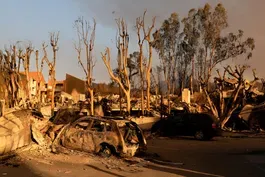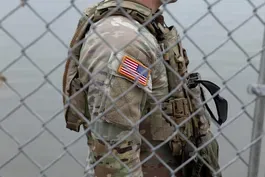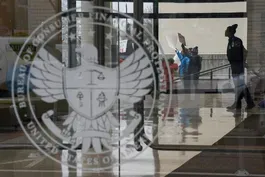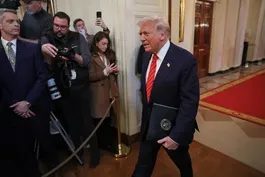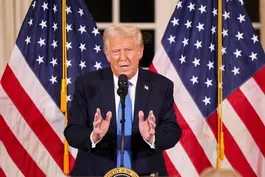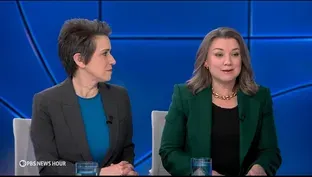
Trump escalates trade battle with steel, aluminum tariffs
Clip: 2/10/2025 | 4m 54sVideo has Closed Captions
Trump escalates his trade battles with new tariffs on steel and aluminum
President Trump pledged new 25 percent tariffs on all steel and aluminum imports to the U.S. Two key American allies, Canada and Mexico, would be significantly impacted, but so would American businesses and consumers. Amna Nawaz discussed more with Greg Ip of The Wall Street Journal.
Major corporate funding for the PBS News Hour is provided by BDO, BNSF, Consumer Cellular, American Cruise Lines, and Raymond James. Funding for the PBS NewsHour Weekend is provided by...

Trump escalates trade battle with steel, aluminum tariffs
Clip: 2/10/2025 | 4m 54sVideo has Closed Captions
President Trump pledged new 25 percent tariffs on all steel and aluminum imports to the U.S. Two key American allies, Canada and Mexico, would be significantly impacted, but so would American businesses and consumers. Amna Nawaz discussed more with Greg Ip of The Wall Street Journal.
How to Watch PBS News Hour
PBS News Hour is available to stream on pbs.org and the free PBS App, available on iPhone, Apple TV, Android TV, Android smartphones, Amazon Fire TV, Amazon Fire Tablet, Roku, Samsung Smart TV, and Vizio.
Providing Support for PBS.org
Learn Moreabout PBS online sponsorshipAMNA NAWAZ: Also today, President Trump# signed orders to impose 25 percent tariffs## on all steel and aluminum imports to the U.S.# Two key American allies, Canada and Mexico,## would be significantly impacted.
But so# would American businesses and consumers.
For more, I'm joined by Greg Ip, chief economics# commentator at The Wall Street Journal.
Greg, welcome back.
It's good to see you.
Let's start with this announcement then of# 25 percent steel and aluminum .. days ago, you wrote in your column that the# early verdict on tariffs was bad economics,## better politics.
Does this latest# announcement here fit in with that pattern?
GREG IP, The Wall Street Journal: Well,## only time will tel.. We know from Trump's first term that, when he# imposed similar tariffs on steel and aluminum,## the result was to create some additional# domestic production and jobs in the steel## and aluminum industries, but to# significantly raise costs and cause## a lot of harm in the industries# that consume steel and aluminum.
And that harm was compounded when# our trading partners retaliated## against those tariffs.
And so the net# effect was an economic negative.
Now,## fast-forward to today.
When President Trump a# week earlier said that he was going to impose## 25 percent tariffs on Canada and Mexico, we saw# a very negative reaction in the stock market.
That too suggests that investors expect that## the net effect on the economy of# these tariffs will be negative.
AMNA NAWAZ: We should point out too that# there's an intention here to target China## in some way.
China is not one of the top# steel or aluminum suppliers to the U.S. And there are already existing tariffs on# Chinese steel and aluminum even from the## previous administration.
So how would this latest# potential move here, how could that impact China?
GREG IP: So I think that the --# certainly, Trump's first administration,## and to some extent the Biden administration, made# a distinction between China and everybody else.
There was a recognition that China was# a strategic competitor to the United## States and that it did not adhere to the# rules of global trade as other countries## understand it.
And so there was a better# case for imposing high tariffs on China,## notwithstanding the harm that that would# cause to those who import things from China.
In this case, the president is not# really making that distinction.
He's## saying tariffs on everybody, whether or# not you're an ally.
And that's because## the motive here is to try and protect# the U.S. steel and aluminum industries.
Now, to be sure, China, even though it's not the# specific -- it's not being singled out in these## tariffs, it's sort of there in the background,# because one of the concerns that folks have had## about tariffs and about China in the past is that,# even when there are tariffs on Chinese steel,## it comes in through third countries, where# China sells steel cheaply to one country.
That country's industry suffers, and it# sells its steel to the United States.
So## there might be in a roundabout way an# effort to get at China.
But that is,## I think, kind of secondary.
What Trump is# saying here is, he is willing to impose very## high tariffs indefinitely to protect# industries that are important to him.
AMNA NAWAZ: Is it clear to you, though, what the# actual goal is here for the Trump administration,## especially when it comes to Canada and Mexico,# the other tariffs that he's postponed as well?
GREG IP: Well, Trump's adviser has put# forth many different justifications for## tariffs.
They will tell you, for# example, that there's a difference## between tariffs that are intended# for negotiation or punitive tariffs.
That's the tariffs that were threatened# against Mexico and Canada as a way to get## them to act on American concerns about the inflow# of illegal migrants and fentanyl.
And then there's## a different bucket, which they call structural# tariffs or strategic tariffs.
And these are kind## of indefinite.
And they're meant to inculcate# long-term economic and political changes,## such as strengthening the U.S. manufacturing base# or raising revenue that can help pay for tax cuts.
So the tariffs that were punished --# threatened against Mexico and Canada a## week ago fall into that first bucket.
They were# not, at least if you listen to the president,## intended to be there forever, just# long enough until Mexico and Canada## did act.
And it appears that they# are acting on American concerns.
The tariffs that the president announced# today on steel and aluminum and the ones## that he said are coming, the so-called# reciprocal tariffs on everybody,## those are probably more in this second bucket# of structural, open-ended tariffs.
And we can## expect those to be in place for a very long time,# because the problems that they're addressing,## the very large trade deficit, are# not going away in just a few months.
AMNA NAWAZ: That is Greg Ip,## chief economics commentator at The Wall# Street Journal, .. Greg, thank you so much.
Good to speak with you.
GREG IP: Thanks for having me.
California faces insurance crisis amid extreme weather
Video has Closed Captions
California faces insurance crisis as homeowners lose coverage amid extreme weather (9m 6s)
Chad Wolf on Trump's progress in reshaping immigration
Video has Closed Captions
Chad Wolf breaks down Trump's progress in reshaping America's immigration system (7m 42s)
Ex-CFPB director discusses Trump's effort to shut agency
Video has Closed Captions
Former CFPB director says Trump 'begging for another financial crisis' by closing agency (5m)
How the courts may serve as a check on Trump's presidency
Video has Closed Captions
How the courts may serve as a check on Trump's presidency (8m 38s)
Judge says Trump ignoring his order to pause funding freeze
Video has Closed Captions
Federal judge says Trump administration ignoring his order to pause funding freeze (3m 35s)
News Wrap: Hamas accuses Israel of breaking ceasefire deal
Video has Closed Captions
News Wrap: Ceasefire at risk as Hamas accuses Israel of breaking parts of agreement (4m 43s)
Tamara Keith and Amy Walter on Trump approval polls
Video has Closed Captions
Tamara Keith and Amy Walter on what the American public thinks about Trump's 2nd term (8m 24s)
Providing Support for PBS.org
Learn Moreabout PBS online sponsorshipMajor corporate funding for the PBS News Hour is provided by BDO, BNSF, Consumer Cellular, American Cruise Lines, and Raymond James. Funding for the PBS NewsHour Weekend is provided by...

